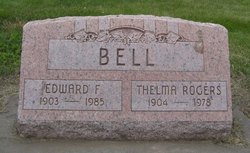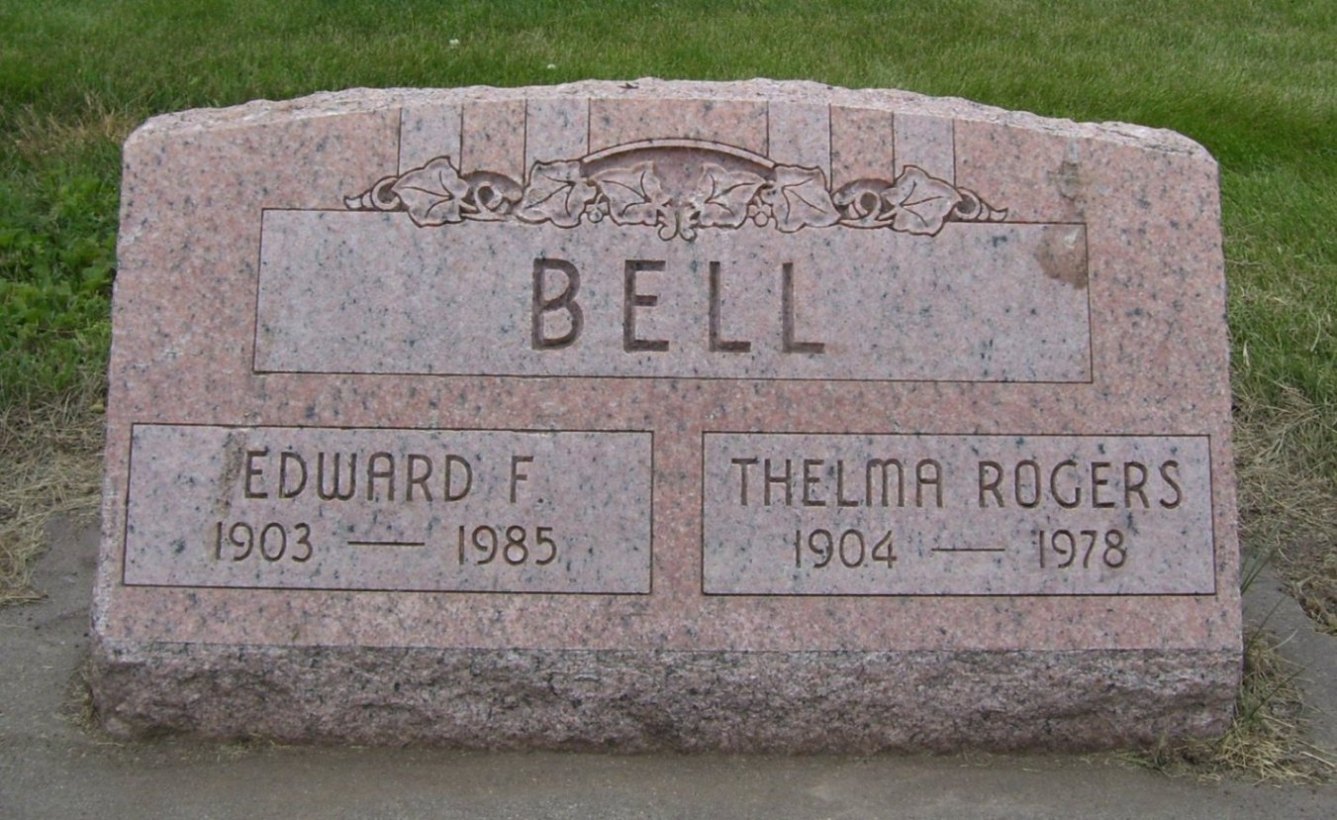OBITUARY:
Mrs. Edward Bell, 73, died Tuesday morning, Jan. 24 in her home in Aurora. She had suffered a lingering illness.
Services for Mrs. Bell were scheduled for 10:30 a.m. Thursday in the chapel of the Higby Mortuary. The Rev. Earl Higgins, associate pastor of the United Methodist Church will officiate. Burial will be in the Aurora Cemetery.
The family requests that no visitations be made.
Thelma Rogers was born May 7, 1904 in Stockton, Kans. She was the daughter of William and Mary Rogers. She attended Salina, Kansas Teachers College.
On March 17, 1926, she was married to Edward Bell in Downs, Kans.
She is survived by her husband, Ed; a daughter. Mrs. Letha Ridge of Lincoln; four sisters, Mrs. Alma Kennedy of Esbon, Kans., Mrs. Elizabeth Keen of Lawrence, Kans., Mrs. Alice Lewis of Denver and Mrs. Frances Thompson of Hordville; two grandchildren, other relatives and many friends.
(Aurora News Register, Aurora, Nebraska, January 26, 1978)
ADDITIONAL BIOGRAPHICAL INFORMATION:
In 1966 Thelma wrote about her childhood and family. She said she was born in a one-room sod house on the farm that her father homesteaded in Rooks County, Kansas. After her grandfather died in 1907, her family moved to a farm in Jewell County, Kansas next to the farm where her grandmother lived and had homesteaded with her husband. Her father helped his brother Curran with their grandmother’s farm.
Thelma’s father bought a small donkey and cart to take the kids to the grade school about three miles away. They would stop at their grandmother’s house on the way and she would give cookies to the kids and sugar to the donkey. The donkey soon learned the route and routine, and needed no guidance. In cold weather, the kids were wrapped in a blanket with hot bricks and the donkey took them to school.
The school had grades one through eight with one teacher for all the students. The school term was during the winter when the boys were not needed for farm work. The school house was heated by a stove in the middle. The students who sat near the stove were too hot and those farther away were too cold. Although Thelma passed the eighth grade, her father had her take it again because he wanted her “to get it good.” Some students attended grade school until they were 20 years old.
The school house was also the center of neighborhood social activities and entertainment. Entertainment included spelling and ciphering (arithmetic) contests. At “box socials,” a program was presented with local people reading or singing, followed by an auction of box suppers brought by various women. The men bid on the boxes without knowing who made the box. The man who purchased a box then ate supper with the woman who made the box. The school got the profits from the box socials.
The daily chores that the children were expected to help with included bringing in and milking the cows, cleaning the milk separator, feeding the chickens, ducks, and geese, closing in the chickens at night, bringing water and firewood to the house, and cleaning and filling the kerosene lamps. Their mother baked bread and pies every morning and the girls helped with that.
Most evenings were spent at home. Thelma’s mother would usually sit and sew, while her father read aloud from a newspaper, a book, or sometimes the Bible. The children played checkers, dominoes, or other quiet games. Later in the evening, their mother would sometimes play the organ and the family would sing, or they sometimes listened to the phonograph that played music on cylinders and had a large horn-shaped speaker.
The family took baths on Saturdays, with all the family using the same bath water. They did not wash their hair during the winter because their mother believed they were apt to catch colds.
Thelma graduated from the high school in Ionia, Kansas in 1924. She said that most kids did not attend high school at that time. Her future husband Edd Bell was a classmate in high school.
According to Jewell County school records, Thelma Rogers taught at the West Branch grade school in Odessa Township for two years starting in 1924—which was the fall after she graduated from high school. After she was married she taught for one year starting in 1928 at Dick school in Burr Oak Township.
Thelma said her husband Edd did many different types of work over the years, including teaching school, farming, keeping books, painting, and hanging paper.
OBITUARY:
Mrs. Edward Bell, 73, died Tuesday morning, Jan. 24 in her home in Aurora. She had suffered a lingering illness.
Services for Mrs. Bell were scheduled for 10:30 a.m. Thursday in the chapel of the Higby Mortuary. The Rev. Earl Higgins, associate pastor of the United Methodist Church will officiate. Burial will be in the Aurora Cemetery.
The family requests that no visitations be made.
Thelma Rogers was born May 7, 1904 in Stockton, Kans. She was the daughter of William and Mary Rogers. She attended Salina, Kansas Teachers College.
On March 17, 1926, she was married to Edward Bell in Downs, Kans.
She is survived by her husband, Ed; a daughter. Mrs. Letha Ridge of Lincoln; four sisters, Mrs. Alma Kennedy of Esbon, Kans., Mrs. Elizabeth Keen of Lawrence, Kans., Mrs. Alice Lewis of Denver and Mrs. Frances Thompson of Hordville; two grandchildren, other relatives and many friends.
(Aurora News Register, Aurora, Nebraska, January 26, 1978)
ADDITIONAL BIOGRAPHICAL INFORMATION:
In 1966 Thelma wrote about her childhood and family. She said she was born in a one-room sod house on the farm that her father homesteaded in Rooks County, Kansas. After her grandfather died in 1907, her family moved to a farm in Jewell County, Kansas next to the farm where her grandmother lived and had homesteaded with her husband. Her father helped his brother Curran with their grandmother’s farm.
Thelma’s father bought a small donkey and cart to take the kids to the grade school about three miles away. They would stop at their grandmother’s house on the way and she would give cookies to the kids and sugar to the donkey. The donkey soon learned the route and routine, and needed no guidance. In cold weather, the kids were wrapped in a blanket with hot bricks and the donkey took them to school.
The school had grades one through eight with one teacher for all the students. The school term was during the winter when the boys were not needed for farm work. The school house was heated by a stove in the middle. The students who sat near the stove were too hot and those farther away were too cold. Although Thelma passed the eighth grade, her father had her take it again because he wanted her “to get it good.” Some students attended grade school until they were 20 years old.
The school house was also the center of neighborhood social activities and entertainment. Entertainment included spelling and ciphering (arithmetic) contests. At “box socials,” a program was presented with local people reading or singing, followed by an auction of box suppers brought by various women. The men bid on the boxes without knowing who made the box. The man who purchased a box then ate supper with the woman who made the box. The school got the profits from the box socials.
The daily chores that the children were expected to help with included bringing in and milking the cows, cleaning the milk separator, feeding the chickens, ducks, and geese, closing in the chickens at night, bringing water and firewood to the house, and cleaning and filling the kerosene lamps. Their mother baked bread and pies every morning and the girls helped with that.
Most evenings were spent at home. Thelma’s mother would usually sit and sew, while her father read aloud from a newspaper, a book, or sometimes the Bible. The children played checkers, dominoes, or other quiet games. Later in the evening, their mother would sometimes play the organ and the family would sing, or they sometimes listened to the phonograph that played music on cylinders and had a large horn-shaped speaker.
The family took baths on Saturdays, with all the family using the same bath water. They did not wash their hair during the winter because their mother believed they were apt to catch colds.
Thelma graduated from the high school in Ionia, Kansas in 1924. She said that most kids did not attend high school at that time. Her future husband Edd Bell was a classmate in high school.
According to Jewell County school records, Thelma Rogers taught at the West Branch grade school in Odessa Township for two years starting in 1924—which was the fall after she graduated from high school. After she was married she taught for one year starting in 1928 at Dick school in Burr Oak Township.
Thelma said her husband Edd did many different types of work over the years, including teaching school, farming, keeping books, painting, and hanging paper.
Family Members
Sponsored by Ancestry
Advertisement
Advertisement
















